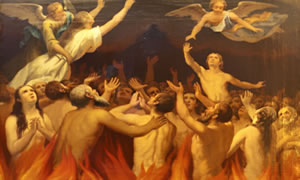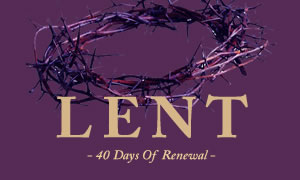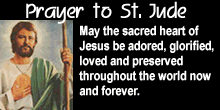


 Those who deny Purgatory speak against the justice of God.
Those who deny Purgatory speak against the justice of God.
St. Thomas Aquinas, ST, Supplement, Appendix 2, 1
Does purgatory exist?
Some who deny the existence of purgatory cite Revelation 14:13: “Blessed are the dead who die in the Lord henceforth. ‘Blessed indeed,’ says the Spirit, ‘that they may rest from their labors, for their deeds follow them!’” The Catechism makes it clear, however, that purgatory exists as a place of cleansing or purgation (1030–1032).
St. Thomas Aquinas explains that the verse from Revelation refers to the labor of working to gain spiritual merit, but does not address the labor of suffering to be cleansed from sin. Any person whose soul is in purgatory has died in charity and merits the eternal reward of heaven, but only after having been cleansed of any remaining venial sins. A soul in purgatory may also bear the effects of mortal sins that have been forgiven, but for which the person has not yet made satisfaction through penance. Revelation confirms that “nothing unclean shall enter” heaven (21:27).
Thomas further explains Church teaching on purgatory with another passage from Scripture and a line from the Eastern Church Father St. Gregory of Nyssa (A.D. 335–394). Scripture tells us, in reference to Judah Maccabee, that “it was a holy and pious thought” that “he made atonement for the dead, that they might be delivered from their sin” (2 Macc. 12:45). Thomas elaborates that there is no need to pray for the souls in heaven, since they already have their reward. Neither is a need to pray for those in hell, because they can no longer be freed from their sins.
Yet those who have died in charity can never suffer everlasting death, since charity covers all sins (Prov. 10:12), and those who follow Christ will have eternal life (John 11:26). Gregory of Nyssa says that the person who loves and believes in Christ, but dies before his sins have been washed away, “is set free after death by the fire of Purgatory.”
Here, God’s justice is made clear. He has provided the purging fires of purgatory so that believers who die still tainted by sin may become clean in the afterlife. Further, He has provided a means whereby we, through our prayers as the Church Militant on earth, may help loosen the bonds of sin of the Church Suffering in purgatory, so that they might sooner rest eternally with God in heaven. Such prayer is, indeed, “a holy and pious thing.”
Are souls cleansed and damned within the same place?
While the existence of purgatory is an established doctrine of the Church, made clear especially at the Councils of Florence and Trent (CCC 1031), Thomas tells us that “nothing is clearly stated in Scripture about the situation of Purgatory, nor is it possible to offer convincing arguments on this question.” In other words, the Bible does not tell us exactly where purgatory is. Still, Thomas declares that some opinions are “of no account”-for example, the idea that purgatory is somewhere above us because the state of the souls in purgatory lies between those living on earth and God in heaven. Nonsense, says Thomas, since those souls are not punished for being above us, “but for that which is lowest in them, namely sin.”
Thomas notes that it is “probable,” according to statements made by holy men and many private revelations, that “there is a twofold place of Purgatory.” One place is according to the “common law.” This place is below us and near hell, so the same fire torments both the souls being cleansed and the souls that are damned in hell, though the damned, being of lower merit, are consigned to the lowest place. Thomas makes the important distinction that while the fires of hell serve to afflict the damned, the fires of purgatory, while painful, serve primarily to cleanse souls from sin.
The second place of purgatory is according to a special “dispensation,” whereby, “as we read,” souls are sometimes punished in various places so that the living may learn from them, or those souls themselves may be “succored [comforted], seeing that their punishment being made known to the living may be mitigated through the prayers of the Church.”
Indeed, we can all hope that we will never know firsthand where in hell the damned reside, and that, should we come to know purgatory’s location (or locations) firsthand, we will not reside there very long!
Are the pains of purgatory greater than any pains of this life?
In Purgatory there will be a twofold pain; one will be the pain of loss, namely the delay of the divine vision, and the pain of sense, namely punishment by corporeal fire. With regard to both the least pain of Purgatory surpasses the greatest pain of this life.?
- St. Thomas Aquinas,?ST, Supplement, Appendix 1, 2, 1
In this quotation, Thomas expands upon Augustine’s declaration that “this fire of Purgatory will be more severe than any pain that can be felt, seen, or conceived in this world.” The soul’s pain of losing the divine vision of God will be greater than any sense of loss of earth because the more we desire something, the more we suffer when it is absent. (Any person who has lost a loved one can attest to this kind of pain.) Yet in purgatory, our overwhelming desire to see God is completely undiluted. The soul’s desire is not hindered or distracted by things of the body. Further, the soul knows that had it not been held back by the weight of sin, it would already have achieved the “Sovereign Good,” as Thomas puts it. Therefore, the soul grieves most intensely because the delay of purgatory keeps it from its ultimate goal.
The soul’s pain of sense in purgatory does not refer to a hurt or injury itself, but to the sense thereof. “The more sensitive a thing is,” Thomas explains, “the greater the pain caused by that which hurt it.” We know from experience that hurts inflicted upon the most sensitive parts of our body cause the greatest pain. Because all bodily sensations arise from the soul, it follows that the most exquisite pain is suffered when the soul itself is hurt.
Therefore, Thomas concludes that the pains of purgatory, both of loss and of sense, surpass all the pains we experience during life.
Do souls in purgatory suffer their punishment voluntarily?
This is an interesting question with, perhaps, a surprising answer, for we cannot imagine choosing to suffer such great pain. Evidence suggesting the answer is no includes the anecdotes in Gregory’s Dialogues about souls in purgatory who appear to the living and ask to be set free. Thomas says the answer is yes, but this requires precise thinking about just what makes an act voluntary.
First, an act may be voluntary as an absolute act of the will. In this sense, the very idea of punishment is contrary to the nature of the will, which always seeks the good, and not pain or punishment. Second, an act may be voluntary as a conditional act of the will, as when a person willingly undergoes some pain or punishment because it allows him to obtain a good he could not attain otherwise.
Thomas provides the simple example of submitting to painful surgical procedures to restore our health and the extreme example of martyrs, who submit to bodily death to procure their reward in heaven. It is in this second sense that the punishments in purgatory are voluntary, since the souls know they will someday set free and obtain their goal of heaven. This we see in the many stories of souls in purgatory who appear to people on earth and ask for prayers to hasten their purification.
Does the fire of purgatory pay the debt of punishment for sin?
Thomas notes that as the punishment one voluntarily endures in this life serves as satisfaction to atone the guilt of sin, all the more so will the more grievous pains of purgatory atone for the debt of punishment for sins. Anyone in debt is freed by paying what he owes. The obligation incurred by guilt is the debt of punishment, and a person is freed from that obligation by undergoing the punishment. Therefore, the answer is yes: “The punishment of Purgatory cleanses from the debt of punishment.”
Are some souls released from purgatory before others?
Some argue that because more-grievous sins warrant more-severe punishments, more-serious sinners would be punished more severely in purgatory, but all souls would suffer for the same amount of time. Thomas answers with an interesting observation about a line from the writings of “the Apostle” (St. Paul) comparing venial sins to wood, straw, and hay (1 Cor. 3:12): as wood remains longer in a fire than straw and hay, some kinds of venial sins will be punished longer than others in the fires of purgatory. Some venial sins “cling” to us more persistently than do others, as we are more inclined to indulge in them repeatedly, and “since that which clings more persistently is more slowly cleansed, it follows that some are tormented in Purgatory longer than others, for as much as their affections were steeped in venial sins.” Further, the severity of punishment corresponds to the amount of guilt, while the length corresponds to how firmly the sin has taken root in the soul. Therefore, some souls may spend longer in purgatory, but suffer less, and vice versa.
This article is adapted from a chapter in Aquinas on the four Last Things by Kevin Vost, Psy. D.


I have been thinking a great deal about my experience at Reconciliation this past Saturday. I felt an intense and unexplainable urge to go and confess my sins when I woke up that morning. I try to go every six weeks or so, but this was no routine visit to the priest for me. I needed to unburden myself of the numerous venial sins I had committed since I last participated in this Sacrament.
Purest Gold: God's Refining Fire in our Lives »
After salvation, many young Christians wonder if there's anything more to their newfound faith than just the security blanket of "being a Christian." Time and time again, God shows himself as a "refiner," and our lives are as gold. God started leading me in this study to understand what He was doing in my life, as well as in the lives of others.
Picking up my pen to write this column, I couldn’t imagine how time flies. Since the last publication of this column I have gone through a lot, especially the loss of my dear mother to whom I dedicate this article. Not only her, but seems I lost a whole generation of my close family.
How to Achieve Business Excellence »
“Do you see a man who excels in his work? He will stand before Kings; He will not stand before unknown men.” Proverbs 22:29
Spiritual Development for our Youth »
Most of us youth in today's fast moving world are easily thrown off by difficulties and worries.
The theme of conversion is a thread that runs all through Lent, but conversion takes on different aspects throughout the phases of Lent. The first two and a half weeks focused on the interior turning of hearts; the liturgy urges the faithful to reflect and examine consciences thoroughly.
Saint Josephine Bakhita »
Feast Day: February 8
Patron Saint Of: Sudan
Saint Josephine Margaret Bakhita was born around 1869 in the village of Olgossa in the Darfur region of Sudan. She was a member of the Daju people and her uncle was a tribal chief. Due to her family lineage, she grew up happy and relatively prosperous, saying that as a child, she did not know suffering.
Catholics Must Fast More Intensely This Lent»
The Norbertine Canons of St. Michael's Abbey have created this digital Lenten retreat so that you can journey through this holy season alongside them. If you want to have one of your best Lenten seasons yet, join us in our Lenten Program "The Great Fast" - https://theabbotscircle.com/the-great-fast-join
When Your Faith Is Put to the Test - Bishop Barron's Sunday Sermon»
Friends, we come now to the Second Sunday of Lent, and we’re on both dangerous and very holy ground with the first reading from the twenty-second chapter of Genesis. The ancient Israelites referred to it as the “Akedah,” which means the “binding”: Abraham binds and is ready to sacrifice Isaac at God’s command.

Copyright © 2002-2024 THE BEACON INTERNATIONAL CATHOLIC MAGAZINE. All rights reserved.
another mc.rufus interactive web design